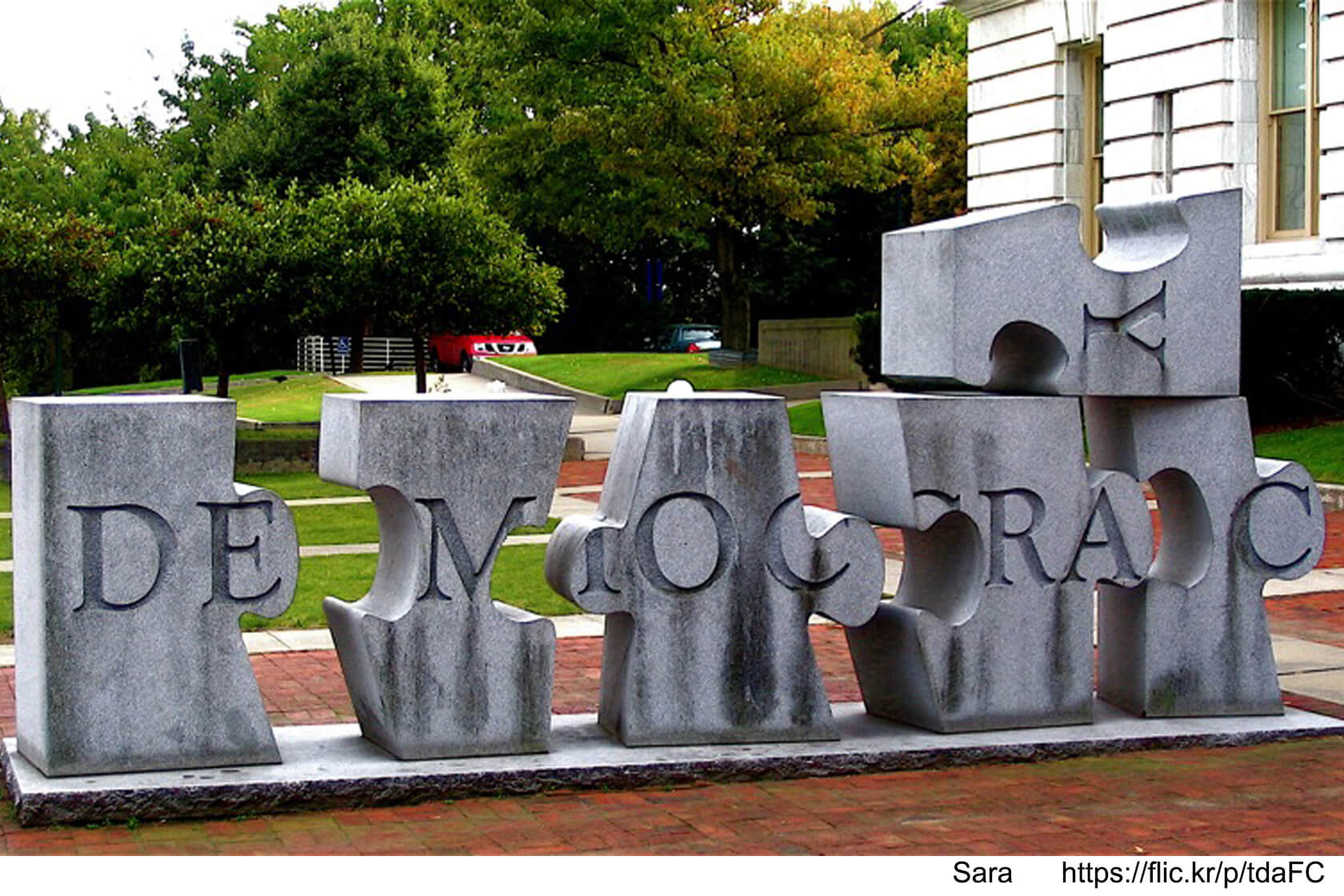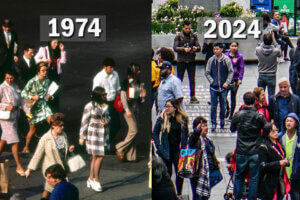West Long Branch, NJ – Most Americans support both easier access to early voting and requiring photo identification to vote, according to the Monmouth (“Mon-muth”) University Poll. The public is more divided on expanding vote-by-mail, although a majority would like to see some national voting guidelines established for federal elections. The poll also finds that only one-third of the public believes “audits” of the 2020 election results are legitimate efforts to uncover irregularities. Moreover, one-third of Americans continue to believe Joe Biden won the presidency only due to voter fraud – a steady trend since November that underlines the crystallization of our nation’s deep partisan divide.
A large majority (71%) of the public feels in-person early voting should generally be made easier. Just 16% say it should be made harder. Opinion is more divided on voting by mail – 50% say this should be made easier and 39% say it should be made harder. At the same time, fully 4 in 5 Americans (80%) support requiring voters to show photo identification in order to cast a ballot. Just 18% oppose this.
Easing in-person early voting access and requiring photo IDs both have bipartisan majority support. Approval of making early voting easier stands at 89% among Democrats, 68% among independents, and 56% among Republicans. Support for requiring a photo ID to vote stands at 62% among Democrats, 87% among independents, and 91% among Republicans. Only Democrats back making voting by mail easier to do, with 84% supporting this idea compared to just 40% of independents and 26% of Republicans.
More than 2 in 3 Americans (69%) support establishing national guidelines to allow vote-by-mail and in-person early voting in federal elections in every state. Just 25% oppose this idea. Support for establishing national voting guidelines on these issues comes from 92% of Democrats, 63% of independents, and 51% of Republicans.
“The poll contains some seemingly conflicting information on voter access. The bottom line seems to be that most Democrats and Republicans want to take the potential for election results to be questioned off the table. The problem, though, is they aren’t likely to agree on how to get there,” said Patrick Murray, director of the independent Monmouth University Polling Institute.
More Americans say voter disenfranchisement (50%) is a major problem in the United States than say the same about voter fraud (37%). Democrats (64%) are more likely than either Republicans (43%) or independents (42%) to see disenfranchisement as being a major problem. Republicans (64%) are more likely than independents (41%) – and both groups are much more likely than Democrats (10%) – to see voter fraud as a major problem. Nine years ago, the overall number of registered voters who considered voter fraud to be a major problem (36%) was similar to the current results, although those who said it was not a problem at all was slightly lower (20%) than it is today (29%). Concern about voter fraud being a major problem has increased among Republicans since 2012 (from 51%) while it has declined by the same amount among Democrats (from 23%).
“Disenfranchising eligible voters is nominally a bigger concern than voter fraud, but the sizable number of Americans who cling to the view that fraud determined the 2020 election poses an intractable challenge for reaching any public consensus on voting access,” said Murray.
One-third (32%) of Americans continue to believe that Joe Biden’s victory in 2020 was due to voter fraud – a number that has not budged since the November election. At first glance in the crosstabs, it looks like the number of “Republicans” who believe this has been trending down while the number of independents who agree has ticked up. However, this appears to be a product of a shift in how Republicans identify themselves, with some moving their self-affiliation from being partisan to being an “independent” who leans partisan. When all Republican identifiers and leaners are combined, the number who believe Biden won only because of voter fraud has been fairly stable (63% now, 64% in March, 69% in January, and 66% in November). Furthermore, 14% of the American public say they will never accept Biden as president, including 3 in 10 (29%) Republicans and Republican leaners.
“The continuing efforts to question the validity of last year’s election is deepening the partisan divide in ways that could have long-term consequences for our Democracy, even if most Americans don’t quite see it that way yet,” said Murray.
Most Americans (57%) see audits of the 2020 election results that are ongoing or planned as primarily partisan efforts to undermine valid election results. One in three (33%), though, say these are legitimate efforts to identify possible voting irregularities. When asked about the impact of these audits, 40% say they will weaken American democracy versus 20% who say they will strengthen our democracy, while 35% say they will have no impact. A majority of Republicans and GOP leaners say these audits are legitimate (61%) and one-third say the audits will strengthen American democracy (34%). Among all other Americans, just 14% say the audits are legitimate with 55% saying they will actually weaken our democracy. Overall, 38% of the American public expects the impact of these audit efforts to be long-lasting, including nearly two-thirds of those who believe they will either weaken (63%) or strengthen (64%) our democracy.
The Monmouth University Poll was conducted by telephone from June 9 to 14, 2021 with 810 adults in the United States. The question results in this release have a margin of error of +/- 3.5 percentage points. The poll was conducted by the Monmouth University Polling Institute in West Long Branch, NJ.
QUESTIONS AND RESULTS
(* Some columns may not add to 100% due to rounding.)
[Q1-10 previously released.]
[Q11-22 held for future release.]
23.Do you believe Joe Biden won the 2020 election fair and square, or do you believe that he only won it due to voter fraud?
| TREND: | June 2021 | March 2021 | Jan. 2021 | Nov. 2020 |
| Fair and square | 61% | 62% | 65% | 60% |
| Due to voter fraud | 32% | 32% | 32% | 32% |
| (VOL) Biden won’t be declared | n/a | n/a | n/a | 2% |
| (VOL) Don’t know | 7% | 6% | 3% | 6% |
| (n) | (810) | (802) | (809) | (810) |
23A.Now that Biden is in office do you feel it is time to move on or will you never accept Biden as president?
| TREND: | June 2021 | March 2021 | Jan. 2021 |
| Time to move on | 16% | 17% | 20% |
| Will never accept Biden as president | 14% | 12% | 10% |
| (VOL) Don’t know | 2% | 3% | 2% |
| Biden won fair/Don’t know (from Q23) | 68% | 68% | 68% |
| (n) | (810) | (802) | (809) |
24.Legislatures in some states are conducting or planning to conduct audits of the 2020 election results. Based on what you have heard, do you think these are legitimate efforts to identify potential voting irregularities or are they partisan efforts to undermine valid election results?
| June 2021 | |
| Legitimate | 33% |
| Partisan | 57% |
| (VOL) Both | 2% |
| (VOL) Don’t know | 7% |
| (n) | (810) |
25.Do you think these vote audits will strengthen or weaken American democracy, or will they have no impact on American democracy?
| June 2021 | |
| Strengthen | 20% |
| Weaken | 40% |
| No impact | 35% |
| (VOL) Don’t know | 5% |
| (n) | (810) |
25A.Will this impact be short-lived or long-lasting?
| June 2021 | |
| Short-lived | 17% |
| Long-lasting | 38% |
| (VOL) Don’t know | 5% |
| No impact/DK (from Q25) | 40% |
| (n) | (810) |
[QUESTIONS 26 & 27 WERE ROTATED]
26.How much of a problem is voter fraud in the United States – that is, votes being cast in the name of people who are not eligible to vote? Is it a major problem, minor problem, or not a problem?
| TREND: | June 2021 | Oct. 2012* |
| Major problem | 37% | 36% |
| Minor problem | 32% | 33% |
| Not a problem | 29% | 20% |
| (VOL) Don’t know | 2% | 12% |
| (n) | (810) | (1,592) |
* Registered voters
27.How much of a problem is voter disenfranchisement in the United States – that is, eligible voters being prevented from casting their ballots or not having their ballots counted? Is it a major problem, minor problem, or not a problem?
| June 2021 | |
| Major problem | 50% |
| Minor problem | 26% |
| Not a problem | 20% |
| (VOL) Don’t know | 4% |
| (n) | (810) |
[QUESTIONS 28 & 29 WERE ROTATED]
28.In general, do you think voting by mail should be made easier or harder?
| June 2021 | |
| Easier | 50% |
| Harder | 39% |
| (VOL) Same, no change | 6% |
| (VOL) Don’t know | 5% |
| (n) | (810) |
29.In general, do you think in-person early voting should be made easier or harder?
| June 2021 | |
| Easier | 71% |
| Harder | 16% |
| (VOL) Same, no change | 9% |
| (VOL) Don’t know | 4% |
| (n) | (810) |
30.In general, do you support or oppose establishing national guidelines to allow vote by mail and in-person early voting in federal elections in every state?
| June 2021 | |
| Support | 69% |
| Oppose | 25% |
| (VOL) Depends | 2% |
| (VOL) Don’t know | 3% |
| (n) | (810) |
31.In general, do you support or oppose requiring voters to show a photo I.D. in order to vote?
| June 2021 | |
| Support | 80% |
| Oppose | 18% |
| (VOL) Depends | 2% |
| (VOL) Don’t know | 1% |
| (n) | (810) |
[Q32-39 previously released.]
METHODOLOGY
The Monmouth University Poll was sponsored and conducted by the Monmouth University Polling Institute from June 9 to 14, 2021 with a national random sample of 810 adults age 18 and older. This includes 281 contacted by a live interviewer on a landline telephone and 529 contacted by a live interviewer on a cell phone, in English. Telephone numbers were selected through a mix of random digit dialing and list-based sampling. Landline respondents were selected with a modified Troldahl-Carter youngest adult household screen. Monmouth is responsible for all aspects of the survey design, data weighting and analysis. The full sample is weighted for region, age, education, gender and race based on US Census information (ACS 2018 one-year survey). Data collection support provided by Braun Research (field), Dynata (RDD sample), and Aristotle (list sample). For results based on this sample, one can say with 95% confidence that the error attributable to sampling has a maximum margin of plus or minus 3.5 percentage points (unadjusted for sample design). Sampling error can be larger for sub-groups (see table below). In addition to sampling error, one should bear in mind that question wording and practical difficulties in conducting surveys can introduce error or bias into the findings of opinion polls.
| DEMOGRAPHICS (weighted) |
| Self-Reported |
| 24% Republican |
| 44% Independent |
| 32% Democrat |
| 49% Male |
| 51% Female |
| 30% 18-34 |
| 33% 35-54 |
| 38% 55+ |
| 63% White |
| 12% Black |
| 16% Hispanic |
| 9% Asian/Other |
| 69% No degree |
| 31% 4 year degree |
Click on pdf file link below for full methodology and crosstabs by key demographic groups.




